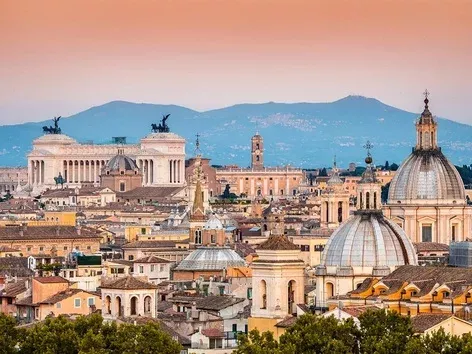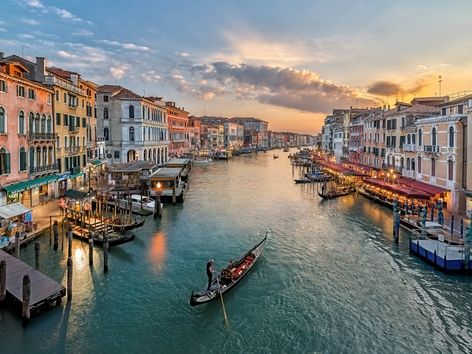Immigrate to Italy in 2024: advantages and disadvantages of moving, how to get a permit and useful tips for expats

Living in Italy is a dream of many people, because the country is distinguished by a high quality of life, amazing food, stunning landscapes and many other advantages. Learn more about the pros and cons of living in Italy, as well as the available ways to move
Often tourists who travel around Italy do not leave the thought of staying here forever. Also, the idea of settling in this country attracts expats who have never even been here. This is not surprising, because Italy is among the top 10 countries in the world with the most powerful economy, and its language, rich culture, history, traditions, cuisine, natural beauty, special charm and extremely developed sphere of fashion attract like a magnet.
How can a foreigner move to Italy in 2024? Let's talk further.
Are there many expats in Italy?
According to the National Institute of Statistics of Italy, foreigners make up 8.7% of the country's population. Most of them live in the center and north of the country, usually in the following regions: Emilia-Romagna, Lombardy, Tuscany and Lazio.
What documents do you need to have to move to Italy?
Since Italy is part of the Schengen area, EU citizens do not need a visa to enter or stay there for up to 3 months, a valid passport or identity card is enough. After the 90 days are over, EU expats only need to register at the registration office of the municipality where they live.
Citizens of non-EU countries to legally enter Italy must have a valid, unexpired and recognized passport or other travel documents, as well as an entry visa, which must be requested at the Italian embassy or consulate in the country of residence .
Visas for moving to Italy
If you are a non-EU citizen and plan to stay in Italy between 90 days and 180 days, you should apply for a short-stay visa, which includes the following categories: tourism, business and study.
Long-term visas – to stay in Italy for more than 3 months, you must apply for a long-term visa. This document is issued on the basis of:
- family reunification or marriage;
- for work - provided there is a signed employment contract with a local company;
- for studying in Italy;
- starting your own business (with the mandatory condition of organizing jobs for the local population);
- investments in the country's economy of at least 250,000 euros;
- the intention to live in the country due to the availability of real estate or simply a sufficient level of income, etc.
For safe relocation to any country in the world, obtaining citizenship and employment, use the advice of an international lawyer. We help you solve complex and simple issues for your comfort and safety anywhere in the world.
Residence permit in Italy
A residence permit gives you the right to stay in Italy for a period of 1 to 5 years.
After 5 years of residence on the basis of a permit, you can apply for a permanent residence permit, and after 10 years you can apply for Italian citizenship.
Types of residence permits in Italy in 2024
Foreigners planning to obtain a residence permit in Italy have several options. Below you can find the most popular ways to obtain a residence permit and immigrate to Italy in 2024.
1. Residence permit for financially independent foreigners - the document is suitable for citizens from non-EU countries who want to live permanently in Italy and have sufficient financial capacity to support themselves without the need to work in Italy.
The minimum required income is from 31,000 euros per year for an individual applicant. The amount increases by 20% for each family member included in the application. The financial resources must come from sources outside Italy, not from employment, but entirely from passive sources: income from the rental of movable or immovable property, royalties, dividends, pensions, etc.
2. An investor visa to Italy, also known as the "Italian golden visa", provides for obtaining resident status by citizens of non-EU countries on the condition of investing in the state's economy.
An investor visa to Italy offers several investment options:
- for innovative startups from €250,000;
- to the authorized capital of Italian companies from €500,000;
- charitable donations for socially significant projects from €1,000,000;
- in government bonds from 2,000,000.
3. Italian residence permit through business (business immigration) - foreigners who wish to open a business in Italy or work as an individual entrepreneur must apply for an Italian long-term visa and then for a residence permit.
4. Digital Nomad Visa – Italy officially launched its digital nomad visa on April 4, 2024. It is intended for highly qualified professionals from non-EU countries who work remotely. Among the main requirements, digital nomads must have an annual remote income of 32,400 euros. Read more about the procedure for obtaining a visa in our material.
5. Self-Employed Visa – The Italian Self-Employed Visa allows highly skilled workers and freelancers to move to Italy and work remotely. This visa is subject to annual quotas that determine the number of work permits for candidates whose employment meets the criteria established for the self-employment visa. The main requirement is to confirm the availability of a sufficient amount of funds to support yourself during your stay in Italy (from 8,500 euros).
6. Residence permit subject to employment or study in Italy.
How long does it take to get a residence permit in Italy?
After submitting the request, applicants receive a "Comunicazione di avvio del procedimento anagrafico" - this is a confirmation that the registration process has been started correctly.
In order for the procedure to be officially completed, the police will go to the address indicated in the application to check whether the applicant really lives there.
The police will check the address specified in the application within 45 days of receiving confirmation.
Once the authorities have successfully verified the address, the residence registration and permit procedure will be completed.
Advantages of living in Italy
- La Dolce Vita Lifestyle – The Italian lifestyle offers many things to suit everyone. The food in Italy is great, but that's not the only thing that makes it a great place to live. Italians take their leisure seriously. From sports to opera, they know how to have fun while also getting intellectual satisfaction.
- Geographical position that allows you to comfortably travel to Europe, the countries of North Africa and the Middle East.
- Comfortable climatic conditions, picturesque landscapes, access to the sea and mountains.
- Unbelievable opportunities for travel, tourism and recreation throughout the year.
- Exquisite food - Italian cuisine is known all over the world, and eating is almost like a religion - Italians often try to have lunch and dinner together with the family, which is why the lunch break sometimes lasts two or three hours.
- The Italian healthcare system is one of the best in the world, and its services are free for all citizens who go to public hospitals.
- A developed economy, a wide range of social guarantees and benefits.
- Competitive job market – as an expat, you will have the best chance of finding a well-paid job in cities such as Rome, Milan, Florence and Bologna.
- Open access to education, high standards of education and recognition of Italian diplomas in the leading countries of Europe and the world.
- Friendly local population.
Also, a pleasant bonus will be the system of adaptation of foreigners and returnees, for whom a wide range of concessions, auxiliary measures and incentives are provided. For example, benefits for the purchase of real estate, help with finding a job or starting your own business.
Disadvantages of moving to Italy
- Language barrier – learning Italian is mandatory for foreigners living in Italy. Italians do not speak English well, so it is necessary to know the local language for work and communication.
- High cost of living in big cities – fuel and electricity prices are one of the main factors behind the high cost of living.
- Bureaucracy is a widespread problem in Italian public services.
- High level of taxes.
Salary level in Italy
The average monthly salary in Italy is €2,479, which equates to an annual salary of €29,748 before taxes and deductions. This is the latest available data from the National Statistics Agency of the country. After deducting taxes and social security contributions, the average net monthly income of workers in Italy is €1,740, i.e. €20,880 per year.
Moving to Italy will be an interesting experience for expats, but it is worth preparing for it in advance, especially considering the large number of bureaucratic issues that a foreigner has to solve. The list of the best cities in Italy for expats to live in in 2024 can be found at the link. The best study programs in Italy for international students are here.
Igor Usyk - Head of Migration department at VisitWorld
To ensure a safe move to a new country, I advise you to consult a specialist. My colleagues, qualified specialists with a legal education, will help you avoid unpleasant situations during migration.
Products from Visit World for a comfortable trip:
Checklist for obtaining a visa and necessary documents in Italy;
Legal advice on immigration in Italy;
Travel insurance for foreigners in Italy;
Medical insurance all over the world.
Recommended articles
2 min
Popular
Italy is one of the most popular European countries among expats. It has many historical and cultural attractions, picturesque small towns, beautiful beaches, and world-famous cuisine. Find out more about the top 7 cities in Italy with the highest quality of life 2025
25 Jan. 2025
More details2 min
Travels
Where to stay in Rome in 2024: Best Neighborhoods
Rome is an extremely popular destination for tourists and expats. The rich history of the Eternal City comes alive through its ancient monuments, stunning museums and galleries, religious sites, and impressive cuisine and culture. Find out more about the top best neighborhoods to live in Rome
29 Feb. 2024
More details2 min
Travels
Taxes in Venice: new conditions for tourists in 2024
Tourists visiting Venice during the peak season will be forced to pay for entry to the city. This innovation aims to suppress excessive tourism and reduce damage to UNESCO world monuments. Find out more about the fines that await those who have not paid the tourist tax in Venice in 2024
29 Apr. 2024
More details3 min
Expats
Digital nomad visa in Italy: procedure for obtaining in 2024
Remote workers can use the Digital Nomad visa to legally reside in Italy. Find out more about the requirements for recipients, the duration of the procedure, and the necessary documents for obtaining a digital nomad visa in Italy in 2024
01 May. 2024
More detailsAll materials and articles are owned by VisitWorld.Today and are protected by international intellectual property regulations. When using materials, approval from VisitWorld.Today is required.
